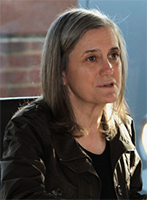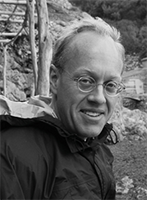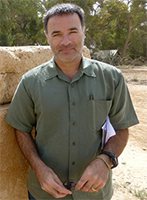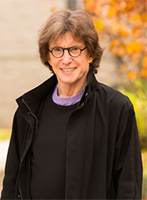
Amy Goodman is the host and executive producer of Democracy Now!, a national, daily, independent, award-winning news program airing on over 1,300 public television and radio stations worldwide. Time Magazine named Democracy Now! its “Pick of the Podcasts,” along with NBC’s Meet the Press.
The Nieman Foundation for Journalism at Harvard honored Goodman with the 2014 I.F. Stone Medal for Journalistic Independence Lifetime Achievement Award. She is also the first journalist to receive the Right Livelihood Award, widely known as the 'Alternative Nobel Prize' for “developing an innovative model of truly independent grassroots political journalism that brings to millions of people the alternative voices that are often excluded by the mainstream media.” She is the first co-recipient of the Park Center for Independent Media’s Izzy Award, named for the great muckraking journalist I.F. Stone. The Independent of London called Amy Goodman and Democracy Now! "an inspiration." PULSE named her one of the 20 Top Global Media Figures of 2009.
Goodman has co-authored five New York Times bestsellers. Her latest two, The Silenced Majority: Stories of Uprisings, Occupations, Resistance, and Hope, and Breaking the Sound Barrier, both written with Denis Moynihan, give voice to the many ordinary people standing up to corporate and government power. She co-authored her first three bestsellers with her brother, journalist David Goodman: Standing Up to the Madness: Ordinary Heroes in Extraordinary Times (2008), Static: Government Liars, Media Cheerleaders, and the People Who Fight Back (2006) and The Exception to the Rulers: Exposing Oily Politicians, War Profiteers, and the Media That Love Them (2004). She co-writes a weekly column with Denis Moynihan (also produced as an audio podcast) syndicated by King Features, for which she was recognized in 2007 with the James Aronson Award for Social Justice Reporting.
Goodman has received the American Women in Radio and Television Gracie Award; the Paley Center for Media’s She’s Made It Award; and the Puffin/Nation Prize for Creative Citizenship. Her reporting on East Timor and Nigeria has won numerous awards, including the George Polk Award, Robert F. Kennedy Prize for International Reporting, and the Alfred I. duPont-Columbia Award. She has also received awards from the Associated Press, United Press International, the Corporation for Public Broadcasting, and Project Censored. Goodman received the first ever Communication for Peace Award from the World Association for Christian Communication. She was also honored by the National Council of Teachers of English with the George Orwell Award for Distinguished Contribution to Honesty and Clarity in Public Language. |

Chris Hedges has written twelve books, including the New York Times best seller “Days of Destruction, Days of Revolt” (2012), which he co-authored with the cartoonist Joe Sacco. Some of his other books include “Death of the Liberal Class” (2010), “Empire of Illusion: The End of Literacy and the Triumph of Spectacle” (2009), “I Don’t Believe in Atheists” (2008) and the best selling “American Fascists: The Christian Right and the War on America” (2008). His book “War Is a Force That Gives Us Meaning” (2003) was a finalist for the National Book Critics Circle Award for Nonfiction.
Hedges previously spent nearly two decades as a foreign correspondent in Central America, the Middle East, Africa and the Balkans. He has reported from more than 50 countries and has worked for The Christian Science Monitor, National Public Radio, The Dallas Morning News and The New York Times, for which he was a foreign correspondent for 15 years.
Hedges was part of the team of reporters at The New York Times awarded a Pulitzer Prize in 2002 for the paper’s coverage of global terrorism. He also received the Amnesty International Global Award for Human Rights Journalism in 2002. The Los Angeles Press Club honored Hedges’ original columns in Truthdig by naming the author the Online Journalist of the Year in 2009 and again in 2011. The LAPC also granted him the Best Online Column award in 2010 for his Truthdig essay “One Day We’ll All Be Terrorists”. In 2012 Hedges won the Southern California Journalism Award for the Online Journalist of the Year.
Hedges is a senior fellow at The Nation Institute in New York City. He has taught at Columbia University, New York University, Princeton University and The University of Toronto. He currently teaches prisoners at a maximum-security prison in New Jersey.
Hedges began his career reporting on the Falkland War from Argentina for National Public Radio. He went on to cover the war in El Salvador and Nicaragua for five years, first for The Christian Science Monitor and National Public Radio and later The Dallas Morning News. Following six years in Latin America, he took time off to study Arabic and then went to Jerusalem and later Cairo. He spent seven years in the Middle East, most of them as the bureau chief there for The New York Times. He left the Middle East in 1995 for Sarajevo to cover the war in Bosnia and later reported the war in Kosovo. Afterward, he joined the Times’ investigative team and was based in Paris to cover al-Qaida. He left the Times after being issued a formal reprimand for denouncing the Bush administration’s invasion of Iraq.
In 2012, Hedges notably sued President Barack Obama after the passing of the National Defense Authorization Act. Unfortunately, the Obama Administration appealed, and the decision was overturned. In 2014 the the Supreme Court denied to review Hedges v. Obama . The act still allows for presidential authority for indefinite detention without habeas corpus.
Hedges holds a B.A. in English literature from Colgate University and a Master of Divinity degree from Harvard University. He was awarded an honorary doctorate from Starr King School for the Ministry in Berkeley, Calif. Hedges speaks Arabic, French and Spanish and studied classics, including ancient Greek and Latin, at Harvard. In addition to writing a weekly original column for Truthdig, he has written for Harper’s Magazine, Le Monde, The New Statesman, The New York Review of Books, Adbusters, Granta, Foreign Affairs and other publications. In 2014, Chris Hedges was ordained as a minister at the Second Presbyterian Church. He lives in Princeton, New Jersey and is married to the Canadian actress Eunice Wong with whom he has two children. He also has two children from a previous marriage. |

Dahr Jamail (born 1968) is an American journalist who was one of the few unembedded journalists to report extensively from Iraq during the 2003 Iraq invasion. He spent eight months in Iraq, between 2003 to 2005, and presented his stories on his website, entitled Dahr Jamail's MidEast Dispatches. Jamail was a reporter for Truthout from 2008-2011[1] and currently reports for Al Jazeera. He has been a frequent guest on Democracy Now!, and is the recipient of the 2008 Martha Gellhorn Prize for Journalism.
Jamail is a fourth generation Lebanese American, and grew up in Houston, Texas. He graduated from Texas A&M University and later moved to Alaska.
In late 2003, weary of the overall failure of the US media to accurately report on the realities of the war in Iraq for the Iraqi people, Dahr Jamail went to the Middle East to report on the war himself, where he has spent more than one year in Iraq as one of only a few independent US journalists in the country. Dahr has also has reported from Syria, Lebanon, Turkey and Jordan. He has also reported extensively on veterans’ resistance against US foreign policy, and is now focussing on anthropogenic climate disruption and the environment.
Dahr’s stories have been published with Truthout, Inter Press Service, Tom Dispatch, The Sunday Herald in Scotland, The Guardian, Foreign Policy in Focus, Le Monde, Le Monde Diplomatique, The Huffington Post, The Nation, The Independent, and Al Jazeera, among others. Dahr’s writing has been translated into French, Polish, German, Dutch, Spanish, Japanese, Portuguese, Chinese, Arabic and Turkish. On radio as well as television, Dahr has reported for Democracy Now! and Al-Jazeera, and has appeared on the BBC, NPR, and numerous other stations around the globe.
Dahr’s reporting has earned him numerous awards, including the 2008 Martha Gellhorn Award for Journalism, The Lannan Foundation Writing Residency Fellowship, the James Aronson Award for Social Justice Journalism, the Joe A. Callaway Award for Civic Courage, and five Project Censored awards.
Books Written:
Beyond the Green Zone: Dispatches from an Unembedded Journalist in Occupied Iraq. 2007. Haymarket Books.
The Will to Resist: Soldiers Who Refuse to Fight in Iraq and Afghanistan. 2009. Haymarket Books.
The Mass Destruction of Iraq: The Disintegration of a Nation: Why It Is Happening, and Who Is Responsible. 2014
|

Henry Giroux (born September 18, 1943), is an American and Canadian scholar and cultural critic. One of the founding theorists of critical pedagogy in the United States, he is best known for his pioneering work in public pedagogy, cultural studies, youth studies, higher education, media studies, and critical theory. In 2002 Routledge named Giroux as one of the top fifty educational thinkers of the modern period.[1]
A high-school social studies teacher in Barrington, Rhode Island, for six years,[2] Giroux has held positions at Boston University, Miami University, and Penn State University. In 2005, Giroux began serving as the Global TV Network Chair in English and Cultural Studies at McMaster University in Hamilton, Ontario.[3][4] He has published more than 50 books and more than 300 academic articles, and is published widely throughout education and cultural studies literature.
Henry Giroux was born in Providence, Rhode Island, the son of Alice (Waldron) and Armand Giroux.[6][7] After teaching high-school social studies in Barrington, Rhode Island, for six years, Giroux earned his doctorate at Carnegie-Mellon in 1977. His first position as a professor was in education at Boston University, which he held for the next six years. Following that, he became an education professor and renowned scholar in residence at Miami University in Oxford, Ohio. While there he also served as the founding Director of the Center for Education and Cultural Studies.[8]
In 1992, he began a 12-year position in the Waterbury Chair Professorship at Penn State University, also serving as the Director of the Waterbury Forum in Education and Cultural Studies.[9] In 2004 Giroux became the Global Television Network Chair in English and Cultural Studies at McMaster University in Hamilton, Ontario.[10] In July 2014, he was named to the McMaster University Chair for Scholarship in the Public Interest. He is currently the Director of the McMaster Centre for Research in the Public Interest. He currently is a Distinguished Visiting Professor at Ryerson University in Toronto, Ontario.
Giroux has been an important contributor to a variety of academic fields, including critical pedagogy, cultural studies, youth studies, and media studies, among others. His work draws from a number of theoretical traditions extending from Marx to Paulo Freire to Zygmunt Bauman. He is also an advocate of radical democracy, vigorously opposing the anti-democratic tendencies of neoliberalism, militarism, imperialism, religious fundamentalism, and the ongoing attacks against the social state, the social wage, youth, the poor, and public and higher education. Giroux's most recent work focuses on public pedagogy, a term he coined to describe the nature of the spectacle and the new media, and the political and educational force of global culture. He is also a regular columnist for Truthout and writes for a variety of academic journals and public venues. |